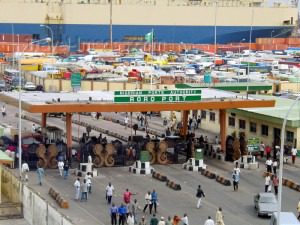National Issues
Nigeria And The Deepening Of Ports Reforms -By Tunde Ogungbesan


For many years, doing business in Nigerian ports was roundly condemned as a harrowing experience. This stemmed from the high level of inefficiency that characterized the operations at the ports such as unnecessary delays in the turnaround time for ships and high cargo dwell time.
The consequences of these were that sub-standard goods found their ways into the country, the national treasury was denied its due accruals, youth unemployment blossomed and the masses were short-changed as the image of the country dimmed in the comity of nations.
The fear of an unfriendly ports climate therefore became the beginning of wisdom for a lot of foreign investors. Unfortunately, Nigeria, since independence and until recently, was conducting affairs at the seaports like a typical civil service set-up. A tinge of reforms introduced in 2006 when the ports terminals were concessioned to the private sector by the federal government yielded little results.
Concessionaires reportedly capitalised on the absence of a regulator to introduce scathing charges that have swelled the cost of doing business in Nigerian ports.
Empirical evidences abound of the Federal Government’s port reform programme.
A Corruption Risk Assessment (CRA) report released by the Independent Corrupt Practices and other Related Offences Commission (ICPC); the Technical Unit on Governance and Anti-Corruption (TUGAR) and the Bureau of Public Procurement (BPP) with the support of United Nations Development Programme (UNDP) on Nigerian ports established that an importer or agent will require a minimum of 79 signatures of government officials to clear his/her goods at the nation’s gateways.
This was viewed by stakeholders as rather unfortunate because the concession of ports to the private sector was aimed to accelerate the pace at which the country’s ports will become the preferred cargo destination for, not only Nigerian importers but also, shippers from some West African and Central African countries.
Several years into the implementation of the seaport concession scheme, the cost of doing business at the nation’s seaports kept going up with shippers and their agents alleging that terminal operators have continued to maintain a regime of arbitrary charges for port services.
They were also complaints over similar cost regime by foreign shipping agents, the multiplicity of levies on imports and inadequacies of other stakeholders in the seaport sector.
No doubt the concessioning of the seaport led to the modernisation of the operations of the ports and a great level of efficiency. Yet, the gains did not translate to reduction in cost of doing business at the ports, a development blamed on the fact that the federal government did not immediately appoint a regulator for the ports sector.
Then came the Nigerian Shippers’ Council (NSC) which was declared the economic regulator of the ports by the federal government in February 2014, eight years after concessionaires took over the management of the seaports. The gazetting of the functions of NSC under the Nigerian Shippers’ Council (Port Economic) Regulations, 2015, has lent credence to the endorsement for its activities and the excellent manner it has discharged its responsibilities and thus affirming the agency as an economic regulator and strengthening and protecting it against unwarranted disobedience to its directives from the stakeholders.
The NSC has acquitted itself by ensuring that all the stakeholders comprising of representatives of Nigeria Customs Service (NCS), Nigeria Immigration Service (NIS), Standards Organization of Nigeria (SON), National Agency for Food & Drug Administration Control (NAFDAC) and freight forwarders among others are regulated and work for common good.
The executive secretary and chief executive officer of the NSC, Mr Hassan Bello, has been lucky to act as a mobilisation and stabilising factor to all agencies at the port. But the NSC must do more. Beyond what is in the statute book, there is a need for the council to harness other potential areas of the port sector with a view to enthroning real competition and bringing down the cost of doing business at the Nigerian seaports.
The uncompetitive nature in the nation’s seaports, cargoes and vessels have, over time, been diverted to ports located in Nigeria’s neighbouring countries such as Cotonou, Republic of Benin, Accra and Tema , Ghana; Lome, Republic of Togo and Dakar , Senegal.
Despite diverting cargoes to these foreign ports, these cargoes later find their ways into Nigerian markets through smuggling. In the end, while Nigeria loses huge income in import duties, levies and other charges payments, these neighbouring countries gain.
It is rather strange that as strategic as our ports are to commerce in the African continent, our ports operated only eight hours daily. Fair enough, a 24 -hour operations that NSC introduced, is a good development even though it ought to have come much earlier than now. Never again must our ports be allowed to operate the bureaucracy of the civil service. They must be seen and operated as businesses to make them the desired maritime destinations to service not only to Nigerians, but to businesses and corporations in the sub-region.
Available statistics from the Federal Ministry of Finance indicate that about 60 percent of goods shipped into West African countries are meant for the Nigerian market. However, the poor management of our ports has resulted in the bulk of the goods destined for Nigeria going through the ports in Ghana and Benin Republic. This has resulted in a backlog of uncleared goods at major ports, in particular, the Lagos, Onne, Warri, Port Harcourt, Calabar, and Sapele – and huge demurrage to importers. It also encourages the smuggling of goods from neighbouring countries into Nigeria.
Interestingly, since the NSC took up the leadership role, we, the port users have witnessed tremendous improvement in complaint and arbitration mechanisms; prompt issuance of Ship Sailing Certificate and the consequent avoidance of demurrage accumulation against shipping companies and other effects. This is in tandem with international best practices.
Also, government now enjoys improved revenue generation; improved infrastructural development; creation of efficient market; reduction of cost of doing business; improvement of the nation’s Global Competitive Index and consequent attraction of Foreign Direct Investment (FDI).
The ports regulator has equally ensured the professionalization of freight forwarding practice. This on its own leads to touting, sanitisation of the ports environment, harmonisation of clearing processes and procedure and consequent reduction of clearing charges.
Without doubt, Nigeria is the regional maritime hub. But the NSC must also be equipped and supported in its drive to help reduce the number of days spent in clearing goods at the ports and for it to achieve the much vaunted quest to make the ports more competitive.
What this means is that government must not lose sight of other problems hindering the effective operations and management of our ports which the ports economic regulator has already started addressing.
— Ogungbesan wrote in from Apapa, Lagos


















